Column: On the hotel worker picket line, retirement is out of the question for many
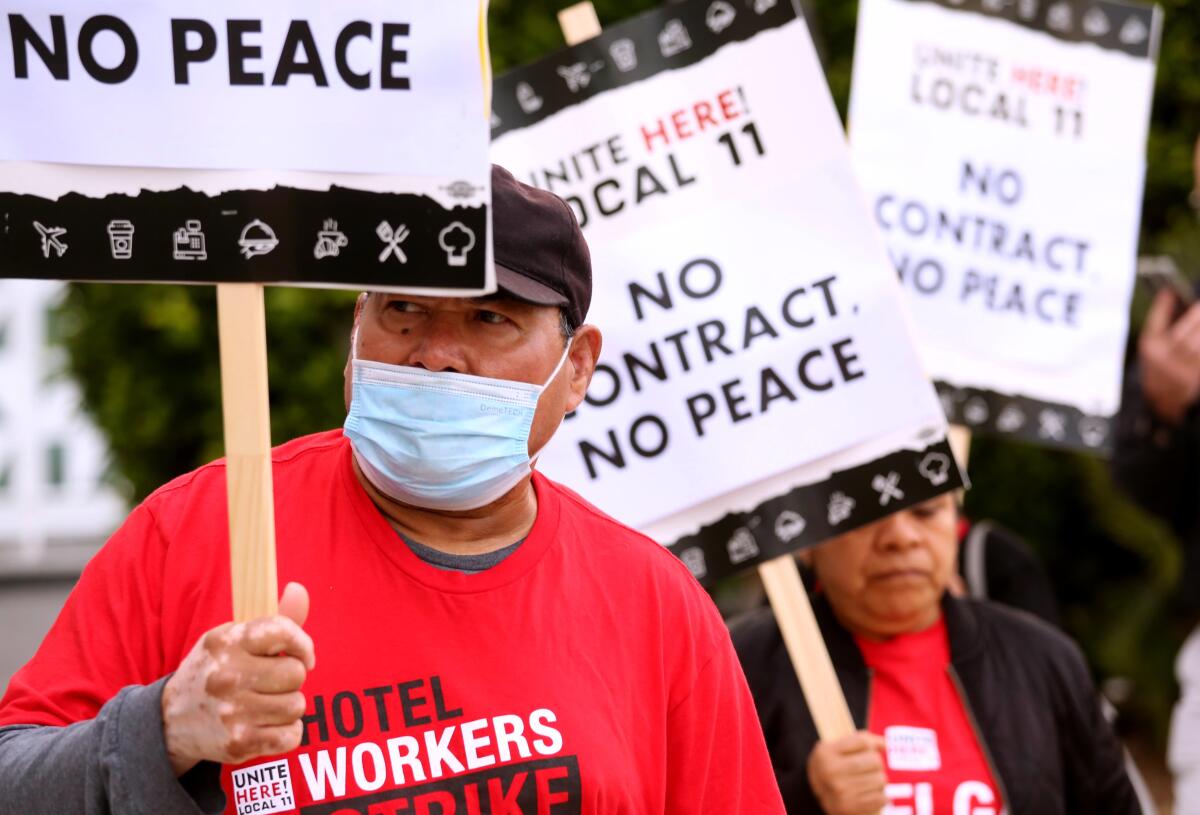
- Share via
The hotel workers began arriving at 5:30 on a recent morning to walk a picket line, and soon they were marching in a circle as the sun rose, chanting and carrying signs that said “No Contract, No Peace.”
Of the 23 housekeepers, dishwashers and food service employees demanding a new deal outside the Viceroy Hotel in Santa Monica, all but five were older than 50.
California is about to be hit by an aging population wave, and Steve Lopez is riding it. His column focuses on the blessings and burdens of advancing age — and how some folks are challenging the stigma associated with older adults.
Six were past 60.
Two were in their 70s.
Like many older Americans, they keep working because they can’t afford to quit. An April report by the Economic Policy Institute summed it up like this:
“No Way Out: Older workers are increasingly trapped in crummy jobs and unable to retire.”
Labor economist and New School professor Teresa Ghilarducci, co-author of that report, told me that as housing and other living costs have risen in the post-pension era, it’s tougher for workers, let alone retirees, to pay their bills. And that financial fragility is far more prevalent among Black and Latino people.
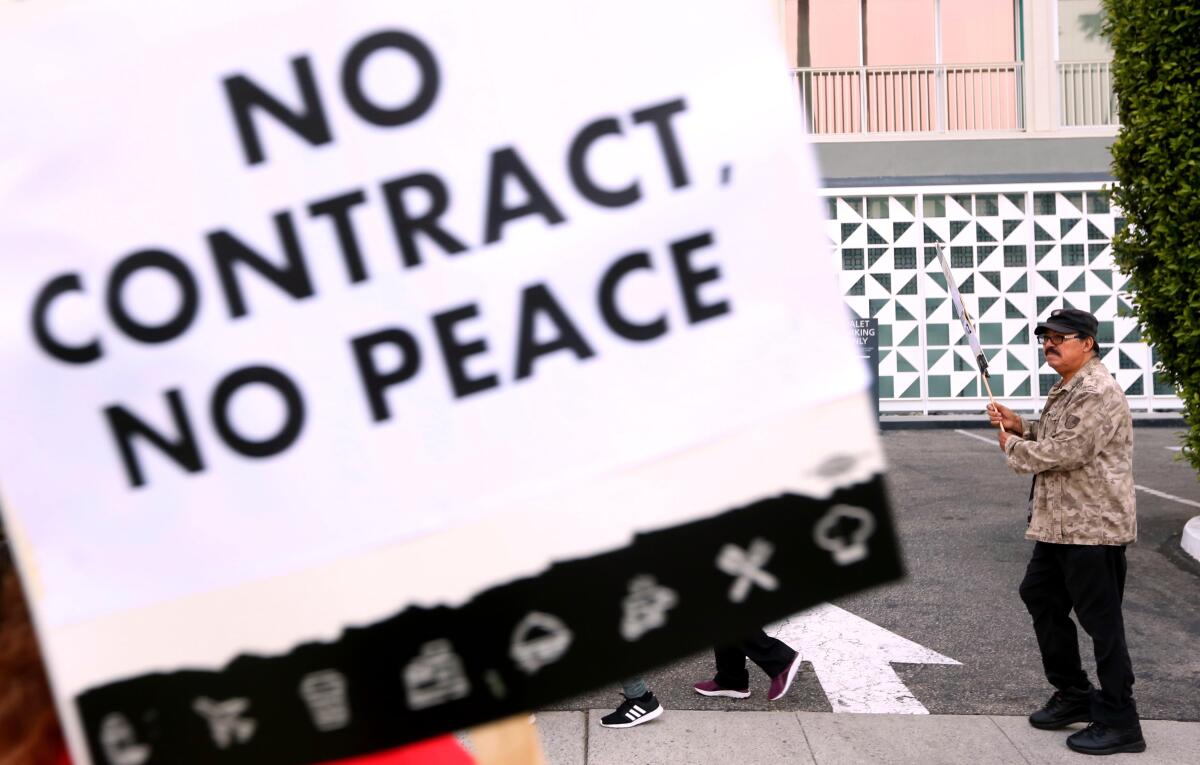
“Twenty-eight percent of all people 62 to 70 are still working, and it’s because they have to,” said Ghilarducci, director of the New School’s Retirement Equity Lab. “That is much, much higher than it used to be.”
Among people in that age group who have retired, she said, 51% are “downwardly mobile … or poor.”
On the picket line in Santa Monica, I noticed that one man, legs bowed, walked with a limp.
“My knee hurts,” said Jose Ayala, 67, a dishwasher at the Viceroy.
I was reminded of a gent I met a couple of years ago while researching my book on retirement. He’d been a middle manager at a utility company, took a buyout after a merger and layoff, and then watched much of his retirement fund vaporize during a market crash.
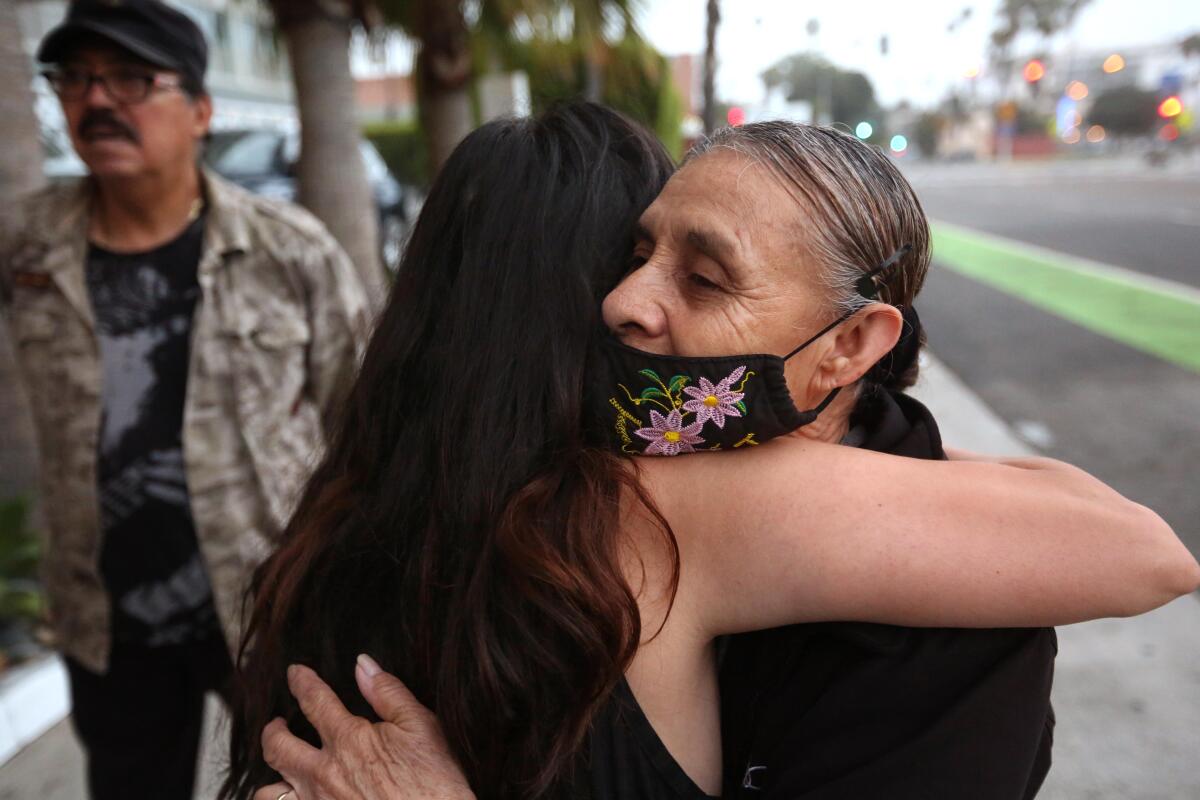
Landing a job was no cinch at his age, and he was in recovery from cancer, with medical bills stacking up. He finally found work as a checker at a discount big-box store, and when I visited, he said his foot ached, probably from standing all day. Several months later, I heard from his wife. He’d finally retired, she said, and died soon after that.
“I’m standing all day,” said dishwasher Ayala, who wasn’t exaggerating much. He has a second job at a nearby restaurant, also five days a week, with five- or six-hour shifts. That’s what it takes — 13 hours a day of work — to pay for an apartment near Culver City, where he lives with his family of four. Ayala said he’ll keep grinding until the end of the year, then decide whether he can afford to give up one of his jobs.
Amparo Rodriguez, 68, said she uses public transit to get to her housekeeping job from the Mid-City studio apartment she shares with her husband. He’s out of work after getting hurt while operating a forklift, so retirement isn’t an option for her after 60 years of work — her first job was cleaning her aunt’s house in Mexico for 1 peso a day.
“Things are difficult,” Rodriguez said. “The bills are high.”
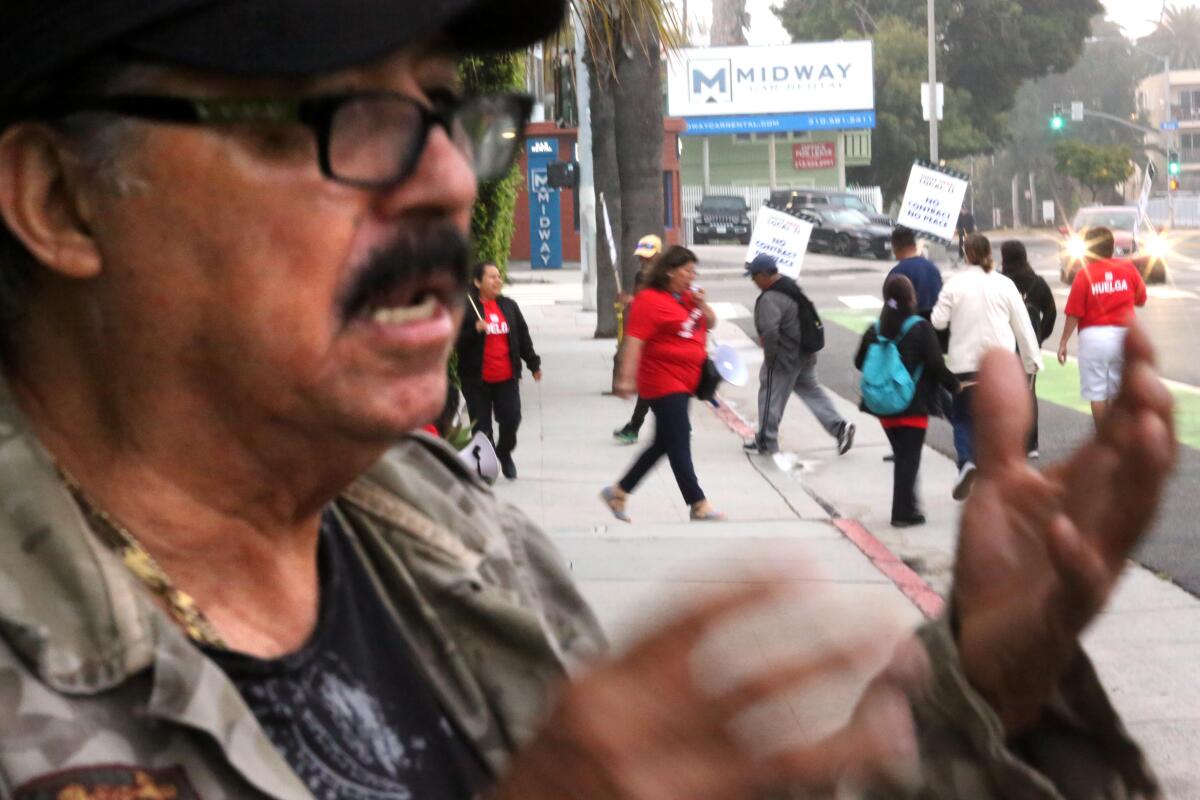
In Southern California, hotel workers have actually come a long way in recent years. Longtime Viceroy employees can earn as much as $25 an hour, with benefits including a modest pension and healthcare.
Economist Ghilarducci said defined benefits, and lowering the Medicare age to 60, would go a long way toward easing financial burdens as people age.
The Viceroy employees are lucky to have gotten improved pay and pensions, she said, but unlucky, as well, because their financial struggles are unlikely to end. They may never be able — while employed or in retirement — to keep up with the rising costs.
“And they’re working in highly physical jobs that will probably make their health worse and their mortality shorter,” Ghilarducci said.
It’s not just the work that takes a toll, it’s the logistics, too. Hotel employees and other essential workers are often forced to commute long distances to cheaper housing. Or to sleep in their cars, as my colleague Brittny Mejia just reported.
The Viceroy employees, and those at more than 40 other area hotels, are represented by Unite Here Local 11, which is asking for a $5-an-hour raise followed by annual $3 raises the next three years. Negotiators for the hotels, many of which have been hit by temporary walkouts, have offered $2.50 this year and a $6.25 increase over four years.
In terms of pay, “these are good jobs, but they’re just not good enough,” Unite Here Local 11 co-President Kurt Petersen said as the Viceroy workers picketed. “That’s what this fight is about. They’re not good enough now, and they’re certainly not good enough to provide people with a retirement.”
The U.S. Bureau of Labor Statistics reported that in 2022, 77,000 hotel employees — roughly 6% of the total —were 65 and older.
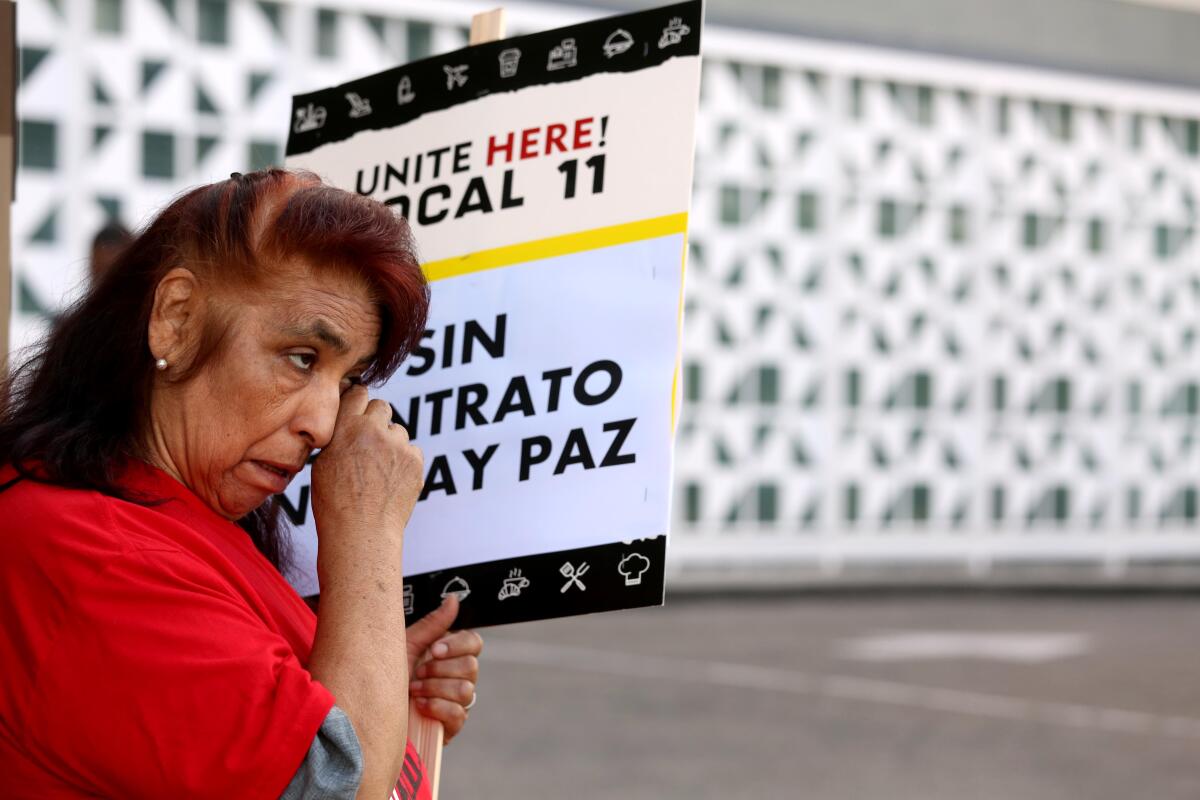
Esther Dorado, 70, who lives in a rear dwelling in Pacoima, took a seat while her colleagues marched on the picket line at the Viceroy. She’s been a housekeeper there for 38 years and counting, but retirement is out of reach at the moment.
“I clean 13 rooms a day,” said Dorado, who added that mini-suites with kids are the toughest, because they bring in sand from the beach and smudge the windows with sticky fingers.
Rooms were available in the $500 nightly range this weekend at the Viceroy, which completed a multimillion-dollar renovation recently.
“Sometimes the guests leave a tip,” Dorado said. “But it’s not guaranteed and it’s not automatic.”
Dishwasher Jacinto Antonio Herrera, 76, said that in his first job, at 7, he milked cows on a ranch in El Salvador. Today he lives in a South L.A. home with eight relatives from El Salvador, and they have four jobs between them. He said he likes working — doing nothing makes him crazy — and enjoys seeing his friends on the job.
“One more year,” Herrera said, and he’ll see if he can afford to retire or go part-time.
As a young man, Herrera said, he fought in El Salvador’s civil war and was captured, imprisoned and tortured.
It was a war over inequity, he said, rich versus poor.
A conflict without borders and without end.
More to Read
Sign up for Essential California
The most important California stories and recommendations in your inbox every morning.
You may occasionally receive promotional content from the Los Angeles Times.










